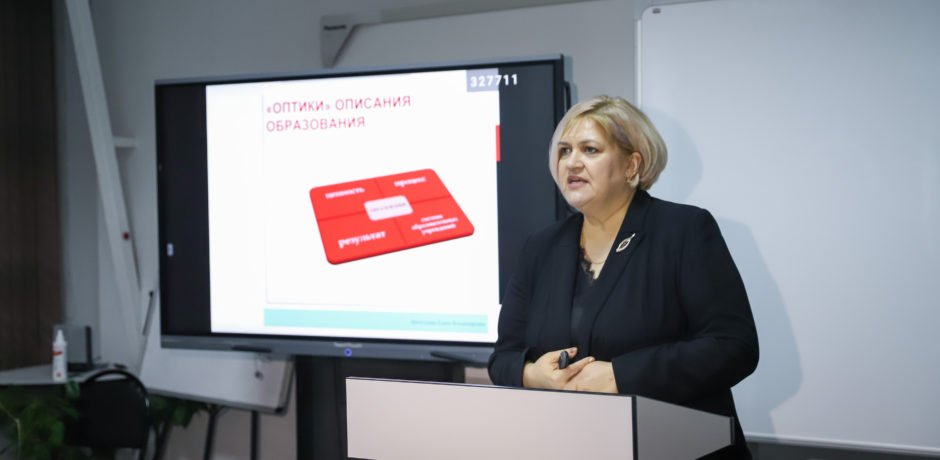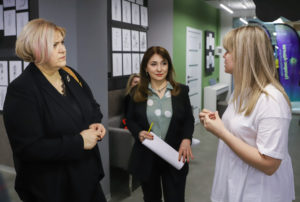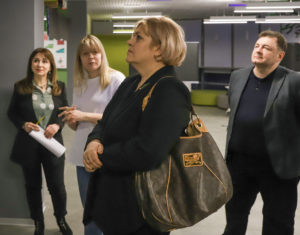News | 10 April 2020

The Caucasus Mathematical Olympiad is more than Mathematics. It’s a celebration of science, a regular feast of research. And what feast is without guests?
ASU Rector Daud Mamiy and Head of Research Svetlana Lyausheva issued a personal invitation to Elena Bryzgalina, bioethicist and the Head of the Department of Educational Philosophy at MSU (Moscow). The meeting took place in the Science and Innovation Park at ASU.
The scope of problems under discussion included a wide range of topics. Ms.Bryzgalina shared her opinion on the subjects not only as a modern philosopher but as a pioneer of the professional future – an expert in bioethics.

It’s hard to tell whether science fiction writers included just such a probability in their calculations. Each of them – from Ray Bradbury to the Strugatsky brothers has their own alternative of the future, as has our guest.
– I believe that we cannot predict the future, but we can and must get ready for it – through our system of education, among other things. People can start doing that by taking responsibility for their own alternative of the future, choosing their learning curve and new technologies.
What steps should we take to ensure positive changes? Some of them might well be political ones. Such alterations were discussed as well – from the point of research, of course. Our guest shared with us what proposed constitutional amendment meant a great deal to her, and why.
“The up-to-date variant of the Constitution proclaims that all rights and freedoms belong to every citizen from birth. An attempt has been made to alter this particular statement to include the genome formation point under the pretense of feasibility and accuracy. The way “the future citizen” was synced with the “prospective” one worried me deeply on all levels of comprehension. The danger of such approach could lead to questionable restrictions in spheres of surrogate maternity, and this is just one example of many. Not every proposed amendment deserves to be legally admissible,” – the philosopher pointed out.
ASU’s staff as well as guests and visitors had a unique opportunity to discuss scientific patterns and moral implications of the future – the one that is just around the corner. New discoveries, unheard of professions and even political changes are about to happen. Will it imply significant alterations of the moral paradigm and a drastic growth of criminal activities as a result?
“Major changes like that in every compartment of life require serious revision and expansion of our professional sphere as proposed by our educational system. Soon there would be new trades and posts devoted to updating moral paradigms – like bioethicists, for example. While it won’t lead to the growth in criminal activities directly
, it might be a contributing factor,” – deliberated our guest. – However, state of the art crime-prevention and solving techniques will also appear. New technologies open new horizons as well as solve old problems”.
Apart from meeting her colleagues, Elena Vladimirovna made three public appearances in the form of a philosophical soiree. Once again the discussion was lively and touched upon a number of subjects. The first one largely dealt with changes in our educational system.
“The thing is that the world’s educational system has shifted significantly from the knowledge acquisition towards competence based paradigm – she pointed out. – This is why I would like to discuss soft and hard skills with you today.”
What do the said skills imply?
FYI: hard-skills – are usually more or less written down in your college diplomas. Knowing your way around sensitive equipment, for instance. Soft skills, however, are not that easy to place in a chosen field. Creativity, communicational skills, and flexible mindset: these criteria are rather useful under any circumstances and are definitely worth acquiring – especially if we consider global digitalization and artificial intelligence (AI).
“Unfortunately, within our system of education, soft skills are yet to claim the limelight”, – declared the philosopher. Be that as it may, our lessons show a distinct preference for projects and cross-disciplinary teamwork. The new generation does not require to be fed the necessary data – they are more than capable of doing cognitive and selective research and analysis on their own.
What skills are required from students and teachers alike? – was by far the most important question asked at the meeting.
Another, equally essential point is why do we need this shift at all? Doesn’t every graduate on a certain educational level acquire a number of competences sort of implicitly? The hard truth
is – no, not quite. But even that isn’t the main drag. “The biggest flaw of the modern system of higher professional education is that the things we teach and learn go out of date, fast,” – explains Ms.Bryzgalina. Some of the subjects students tackle during their first year at college may change quite drastically by point of their graduation.
The competence-based shift has a number of advantages as well, globalization being one of them. Countries and universities notwithstanding, it is much more crucial to be certain of your co-worker’s skills and abilities than the name of his or her alma mater.
“A number of socio-economic factors played along – for instance, the concept of human capital assets, – emphasizes the Professor, – thus, nowadays, every person is valuable not only because of what he could accomplish right now, but due to his potential use and merit to the economy, to the society, his family, even himself.
Under the circumstances morals and ethics shift to a whole new level, especially where scientists and researchers are concerned. How important are the matters of principle to the men and women of science?
“Their significance in the fields of both science and research grows in leaps and bounds. Due to three equally crucial compartments of life – science as a social institution, moral-oriented scientific strata and constant access to diverse social norms and standards, personal or religious, every scientist ought to consider work ethics, his or hers, on a permanent basis, – replied our guest.
The philosophical and psychological aspects of artificial intelligence can be both challenging and fascinating, especially in the sphere of medicine.
“Legally the development of AI in our country falls under the Presidential decree of 2019- bioethicist specified – if we take global tendencies into account, there are three primary spheres where AI would rapidly develop: healthcare, education and municipal legislation.”
How can we lawfully and rightfully apply AI within medical field and what issues might we deal with in this case?
The issue of applying artificial intelligence in medicine is a tricky one, to say the least, on the one hand being absolutely necessary, while raising a number of reasonable concerns on the other. Especially if considerable therapeutic or surgical interference is at stake. Could any “machina sapiens” make a correct risk assessment in lieu of “the human factor”? This is what ASU’s guest thinks about the broached topic.
“Multi-robot systems and robotic consoles like the Da Vinci robot surgeon already operate in hospitals, with a high success rate. The key point here is entrusting AI with absolute control in life or death situations leaving the machine to calculate all possible risks without human supervision – clarified Ms.Bryzgalina – Today robotic devices fail to make a correct assumption of all personal aspects involved and consider a patient as an equal partner.”

Among the most controversial topics were medicalization of human life – thus widening the sphere controlled by MDs – and geneticisation . Fifty years ago manipulation over human genome was linked to science fiction breakthrough. If we go back a bit further, a little over a century ago medical men tried to cure the sick with an approach that is rapidly gaining popularity today. How ethical is using hypnosis as a therapeutic technique?
“All manner of manipulations on human psyche are regulated by a relatively new concept of “neuroethics”, the principles of which are yet being formulated. Obviously, we cannot fully prohibit the therapeutic usage of hypnosis and similar techniques. We can only try to establish boundaries and verify the long-term remedial effect of the procedure. Let’s not discount the more susceptible patient categories, for instance children
, or people with OCDs. “Ideal human”, while being a very lucrative outcome implies grave and illegal endangerment of our psyche in the first place. This is why I chose to treat such techniques with extreme caution” – shared our guest.
Genome analytics say that soon enough the habitual definition of health per se, will cease to exist – granted that preventive medicine fulfills and exceeds all expectations, of course. Isn’t one of the key perks of perfect health never having to think about it? Because that leaves us with a lot of new ground to consider. A whole terra incognita with myriads of monumental choices to face. How well prepared are we, exactly, for the future that lies ahead?
After such complex and controversial topics the last lecture given by the Moscow scholar turned the lecture hall into a fairy-tale realty – several of them, in fact. Cinderella fans had a mind-blowing opportunity to find out grains of truth in the soon-to-be-princess murky past, explore and observe an array of cultures and epochs through her eyes. Ancient Egyptian wall-flower, bold and decisive Neapolitan beauty, or the French femme naturelle – all of them share a secret – a guide to happiness that withstood centuries of choices and proved the worth if its principles over time.
All in all, the visit was fruitful, informative and highly enjoyable. We hope to continue with this new yet fascinating scientific cooperation between our two universities – ASU and MSU.